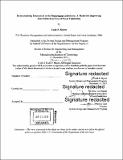Democratizing innovation in the Department of Defense : a model for improving innovation in an era of fiscal tightening
Author(s)
Myers, Todd P. (Todd Preston)
DownloadFull printable version (9.664Mb)
Other Contributors
System Design and Management Program.
Advisor
Eric von Hippel.
Terms of use
Metadata
Show full item recordAbstract
Democratized innovation is a paradigm characterized by users moving beyond the traditional construct that portrays them as passive recipients of firm-developed products. This field of research was launched by Professor Eric von Hippel in the 1970s with his landmark study on the scientific instrument industry that identified users as the source for the majority of new products on the market. Following this work, empirical studies have been conducted in countless other fields; however, the existing research regarding user innovation within the military is lacking This work contributes to the existing literature by investigating user innovation principles within the context of the DoD with a multi-axis study that examines toolkit-related innovation, user-initiated projects, institutional attempts to stimulate user innovation, and the introduction of maker spaces. The exploratory research included here allows us to study patterns and compare internal and external factors in a way that avoids extrapolating overly broad conclusions from a single case. Considered together, the projects yield evidence supporting the existence of user innovation within the Army, Air Force, Navy, and Marines. They are also a mix of software development, hardware modification, and "platforming" initiatives. Our findings reveal environmental factors that, at times, stunt the naturally occurring user innovation processes and distort the democratized innovation construct formulated by von Hippel and his colleagues. Following the identification of these barriers to user innovation, we suggest ways in which DoD leadership might rebalance the scales between formal R&D units and user-innovators. These proposals consist of catalyzing agents that would serve to counteract DoD-specific barriers to user innovation and allow the military to access previously untapped human capital. Throughout this work, user innovation is shown to hold significant promise as an additional source of new product concepts for the DoD. The current state of the military acquisitions system, which is beset by aging equipment, a shifting strategic picture, rapid technological change, and declining budgets, demands that this promise be acted upon.
Description
Thesis: S.M. in Engineering and Management, Massachusetts Institute of Technology, Engineering Systems Division, February 2014. Cataloged from PDF version of thesis. "13 December 2013." Includes bibliographical references (pages 98-103).
Date issued
2014Department
System Design and Management Program.; Massachusetts Institute of Technology. Engineering Systems DivisionPublisher
Massachusetts Institute of Technology
Keywords
Engineering Systems Division., System Design and Management Program.